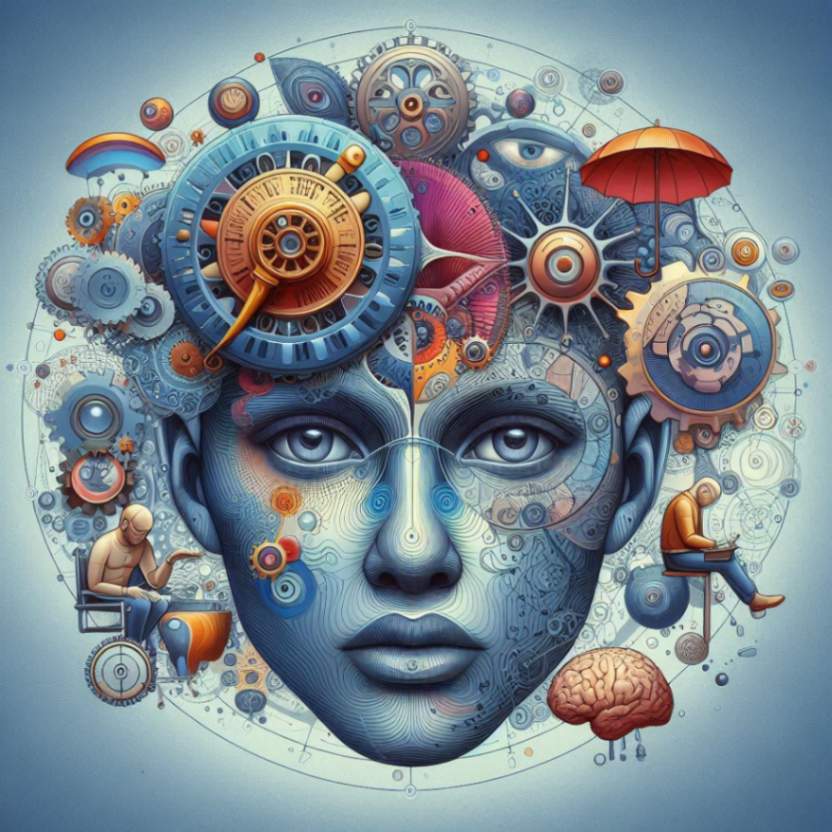Chapter-1 Part-1
Introduction
- In this chapter Part 1, we will study Introduction to Psychology.
- Psychology is the Study of the Fascinating Mind, Feelings, and Behavior.
- We always want to know:
- Why do our actions and decisions create a certain result?
- Why do feelings and behaviour change when we are in different situations?
- Why do people become friends and later become enemies?
- Why do some people learn things quickly and others learn slowly?
- These questions can be answered by anyone. But psychologists can give better answers about how we think. Because they know more about how our mind works. Additionally, they use scientific methods to make sure their answers are correct.

Definition
- Psychology helps us to understand how people think(Mental processes), How they feel Inside(Experience) and how they behave(Behaviour) using systematic processes and a scientific approach
- A systematic process means to work carefully, step by step without making mistakes.
- A scientific Approach means studying and understanding something scientifically by using experiments, observation and logical thinking.
Root Word
- The word Psychology comes from 2 Greek words Psyche + Logos.
- So psychology means the Study of the soul.
- To understand the Soul, Psychologists study a person’s thoughts(Mental process), Feelings(experiences) and behaviour and actions (behaviour and personality). These 3 things make a person unique and special from one another.
What did ancient people do to understand how the mind works and how to control it?
- During the Ancient and Vedic periods, People focused only on understanding how the mind works, and its different parts such as thoughts, memories etc, Instead of focusing on the physical body.
- Later different traditions and Religions like yoga, Samkhya, Vedanta, Nyaya, Buddhism Jainism and others developed their own ideas about how the mind works and showed ways such as meditation, mindfulness, breathing exercises and other mental exercises to control it.
When did people first begin to learn about psychology in Western countries and India?
- Western countries officially started studying psychology in 1879 when Wilhelm Wundt opened the first Psychology lab at the University of Leipzig in Germany.
- Calcutta University introduced psychology studies in India in 1916.
3 Components of Psychology
- The Psychologist study Three components(main areas) of Psychology to understand a person
- Feelings(Experiences) of the people
- Thoughts(Mental processes)
- Behaviour
- Let’s understand one by one
Psychologists study the Feelings(Experiences) of people
- Psychologists study both the special feelings of a person that are kept as secret as well as feelings that are shown openly to everyone.
- Meditation and Dreams feel different feelings you get when you use drugs. Let’s see how:
- A person who is in a Dream or Meditation has a different feeling than a person who took drugs.
- When we are in a Dream, the Mind is active while our body is at rest.
- When you meditate and pay attention to your breath or a mantra, you feel relaxed. Since you become relaxed, you can see your thoughts and feelings. In the end, this helps you to stay alert and notice everything around you. This short period when you are fully alert and notice everything around you is known as Moments
- While Caffeine makes your brain more active. Therefore you stay alert and notice everything happening around you.
- By understanding these feelings psychologists discover that
- Each individual sees the world uniquely.
- Seeing the world in their own way makes each person different from one another and unique.
Psychologists study what happens in the brain when people think and feel(Mental processes)
- Our brain does three special things: Learning, Thinking and Remembering. These 3 are together called Mental processes.
- We cannot see Mental processes using the Naked eyes.
- Therefore Psychologists observe the behaviour of people to understand the mental processes happening inside the brain.
- Thus Psychologist use our behaviour
- to find what’s happening inside our brain(Mental processes)
- To guess what people think and feel.
Psychologists watch and learn from people’s behaviour
- There are two types of behaviour:
- Simple Behaviour
- Complex Behaviour with Complex actions
- Simple Behaviour refers to automatic actions performed by our body naturally—for example, Blinking, Yawning, Chewing, Breathing etc.
- Complex Behaviour comes from a lot of learning, thinking and practice. example to learn to play the piano, to give a speech to a large crowd etc.
- Complex action refers to skills and thinking needed for a single complicated task. For example, playing the piano is complex because it involves coordinating hand movements, reading music, and understanding rhythm and tempo.
- We can use the following tools to see which part of the brain works when these behaviours are performed:
- EEG(Electroencephalogram)
- fMRI(functional Magnetic Resonance Imaging)
- People show their feelings with words and expressions on their faces. Psychologists watch these actions to understand people’s behaviour.
- Emotions shown using words are called Verbal actions.
- Emotions shown using body language(Facial expression)are called Non-verbal actions.
In Summary
- Psychology is the Study of the Fascinating Mind, Feelings, and Behavior.
- Psychologists are excited to discover how humans understand and learn their surroundings.
- To do this they pay close attention to simple and complex behaviour to learn why people behave the way they do.
- Psychologist studies 3 components(main areas) of psychology:
- Behaviour
- Mental processes
- Experience
- Psychologist studies how these 3 components work together and how they affect each other. for example
- How thinking(feeling) affects your action(Behaviour)- for example, If you study well you will get a good grade
- How do your past experiences example happy childhood days make you feel happy now(at present)?
- By studying these components, psychologists learn why people behave in a certain way based on their thoughts, feelings and experiences.
